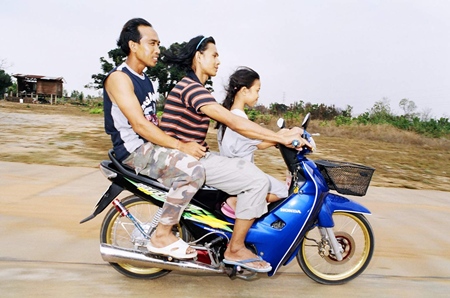The above caption came with a press release from the World Health Organization (WHO), with the sub-header “Decade of Action for Road Safety 2011-2020 set to save millions of lives.”
Forgive my skepticism, but just “how” is this going to happen? We are told that, “From New Zealand to Mexico and the Russian Federation to South Africa, governments are committing to take new steps to save lives on their roads.” It goes on, “To mark the launch of the Decade, governments in countries such as Australia, Cambodia, Ethiopia, Indonesia, Kuwait, Malaysia, Mexico, Niger, Nigeria, the Philippines, Slovenia, Sri Lanka, Uzbekistan and Viet Nam will host high-profile events and release national plans to improve safety and services for victims.”
 Helmets in Thailand.
Helmets in Thailand.
The usual way these things happen is through buckets of money being thrown at all these governments, which will do the trick. Really?
Just look at some of these unimpeachable governments. Cambodia, Ethiopia, Indonesia, Mexico, Nigeria (do I smell another scam coming?) and Uzbekistan. None of these have any problems with corruption, do they? If you don’t believe me go to http://en.wikipedia.org/wiki/Corruption_Perceptions_Index and see how these nations appear on the corruption listings. (Let me guess now where the WHO money will go?)
So here’s how it will happen, according to WHO, “The Global Plan outlines steps towards improving the safety of roads and vehicles; enhancing emergency services; and building up road safety management generally. It also calls for increased legislation and enforcement on using helmets, seat-belts and child restraints and avoiding drinking and driving and speeding.”
The report continues, “Pedestrians, cyclists, and motorcyclists collectively represent almost half of those killed on the world’s roads. Most of the progress has been made in the last few decades has been towards protecting people in cars. The Global Plan suggests measures that may afford these vulnerable groups protection – such as building cycle and foot-paths and separate motorcycle lanes or improving access to safe public transport.”
Looking at Thailand’s experience, where about 80 percent of the road deaths are motorcyclists and the legislation is already here regarding motorcycle helmets and drinking and driving, so how is the WHO going to make “enforcement” happen? Buckets of money won’t even make policemen wear helmets, or do up the straps.
Or does the WHO know something you and I don’t?




